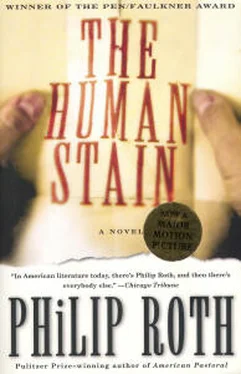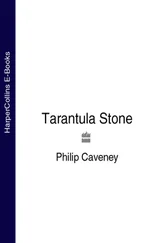“They meant to kill me and they got her instead.” So Coleman told me more than once during that unannounced visit to my house, and then made sure to tell every single person at her funeral the following afternoon. And so he still believed. He was not susceptible to any other explanation. Ever since her death — and since he'd come to recognize that his ordeal wasn't a subject I wished to address in my fiction and he had accepted back from me all the documentation dumped on my desk that day — he had been at work on a book of his own about why he had resigned from Athena, a nonfiction book he was calling Spooks.
There's a small FM station over in Springfield that on Saturday nights, from six to midnight, takes a break from the regular classical programming and plays big-band music for the first few hours of the evening and then jazz later on. On my side of the mountain you get nothing but static tuning to that frequency, but on the slope where Coleman lives the reception's fine, and on the occasions when he'd invite me for a Saturday evening drink, all those sugary-sweet dance tunes that kids of our generation heard continuously over the radio and played on the jukeboxes back in the forties could be heard coming from Coleman's house as soon as I stepped out of my car in his driveway. Coleman had it going full blast not just on the living room stereo receiver but on the radio beside his bed, the radio beside the shower, and the radio beside the kitchen bread box. No matter what he might be doing around the house on a Saturday night, until the station signed off at midnight — following a ritual weekly half hour of Benny Goodman — he wasn't out of earshot for a minute.
Oddly, he said, none of the serious stuff he'd been listening to all his adult life put him into emotional motion the way that old swing music now did: “Everything stoical within me unclenches and the wish not to die, never to die, is almost too great to bear. And all this,” he explained, “from listening to Vaughn Monroe.” Some nights, every line of every song assumed a significance so bizarrely momentous that he'd wind up dancing by himself the shuffling, drifting, repetitious, uninspired, yet wonderfully serviceable, mood-making fox trot that he used to dance with the East Orange High girls on whom he pressed, through his trousers, his first meaningful erections; and while he danced, nothing he was feeling, he told me, was simulated, neither the terror (over extinction) nor the rapture (over “You sigh, the song begins. You speak, and I hear violins”). The teardrops were all spontaneously shed, however astonished he may have been by how little resistance he had to Helen O'Connell and Bob Eberly alternately delivering the verses of “Green Eyes,” however much he might marvel at how Jimmy and Tommy Dorsey were able to transform him into the kind of assailable old man he could never have expected to be. “But let anyone born in 1926,” he'd say, “try to stay alone at home on a Saturday night in 1998 and listen to Dick Haymes singing ‘Those Little White Lies.’ Just have them do that, and then let them tell me afterwards if they have not understood at last the celebrated doctrine of the catharsis effected by tragedy.”
Coleman was cleaning up his dinner dishes when I came through a screen door at the side of the house leading into the kitchen. Because he was over the sink and the water was running, and because the radio was loudly playing and he was singing along with the young Frank Sinatra “Everything Happens to Me,” he didn't hear me come in. It was a hot night; Coleman wore a pair of denim shorts and sneakers, and that was it. From behind, this man of seventy-one looked to be no more than forty — slender and fit and forty. Coleman was not much over five eight, if that, he was not heavily muscled, and yet there was a lot of strength in him, and a lot of the bounce of the high school athlete was still visible, the quickness, the urge to action that we used to call pep. His tightly coiled, short-clipped hair had turned the color of oatmeal, and so head-on, despite the boyish snub nose, he didn't look quite so youthful as he might have if his hair were still dark. Also, there were crevices carved deeply at either side of his mouth, and in the greenish hazel eyes there was, since Iris's death and his resignation from the college, much, much weariness and spiritual depletion. Coleman had the incongruous, almost puppetlike good looks that you confront in the aging faces of movie actors who were famous on the screen as sparkling children and on whom the juvenile star is indelibly stamped.
All in all, he remained a neat, attractive package of a man even at his age, the small-nosed Jewish type with the facial heft in the jaw, one of those crimped-haired Jews of a light yellowish skin pigmentation who possess something of the ambiguous aura of the pale blacks who are sometimes taken for white. When Coleman Silk was a sailor at the Norfolk naval base down in Virginia at the close of World War II, because his name didn't give him away as a Jew — because it could as easily have been a Negro's name — he'd once been identified, in a brothel, as a nigger trying to pass and been thrown out. “Thrown out of a Norfolk whorehouse for being black, thrown out of Athena College for being white.” I'd heard stuff like that from him frequently during these last two years, ravings about black anti-Semitism and about his treacherous, cowardly colleagues that were obviously being mainlined, unmodified, into his book.
“Thrown out of Athena,” he told me, “for being a white Jew of the sort those ignorant bastards call the enemy. That's who's made their American misery. That's who stole them out of paradise. And that's who's been holding them back all these years. What is the major source of black suffering on this planet? They know the answer without having to come to class. They know without having to open a book. Without reading they know — without thinking they know. Who is responsible? The same evil Old Testament monsters responsible for the suffering of the Germans”.
“They killed her, Nathan. And who would have thought that Iris couldn't take it? But strong as she was, loud as she was, Iris could not. Their brand of stupidity was too much even for a juggernaut like my wife. ‘Spooks.’ And who here would defend me? Herb Keble? As dean I brought Herb Keble into the college. Did it only months after taking the job. Brought him in not just as the first black in the social sciences but as the first black in anything other than a custodial position. But Herb too has been radicalized by the racism of Jews like me. ‘I can't be with you on this, Coleman. I'm going to have to be with them.’ This is what he told me when I went to ask for his support. To my face. I'm going to have to he with them. Them!”
“You should have seen Herb at Iris's funeral. Crushed. Devastated. Somebody died? Herbert didn't intend for anybody to die. These shenanigans were so much jockeying for power. To gain a bigger say in how the college is run. They were just exploiting a useful situation. It was a way to prod Haines and the administration into doing what they otherwise would never have done. More blacks on campus. More black students, more black professors. Representation — that was the issue. The only issue. God knows nobody was meant to die. Or to resign either. That too took Herbert by surprise. Why should Coleman Silk resign? Nobody was going to fire him. Nobody would dare to fire him. They were doing what they were doing just because they could do it. Their intention was to hold my feet over the flames just a little while longer — why couldn't I have been patient and waited? By the next semester who would have remembered any of it? The incident — the incident! — provided them with an ‘organizing issue’ of the sort that was needed at a racially retarded place like Athena. Why did I quit? By the time I quit it was essentially over. What the hell was I quitting for?”
Читать дальше












